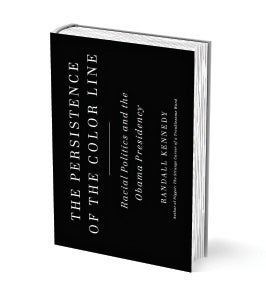On the night Barack Obama ’91 was elected president of the United States, many people cried tears of joy. For many black people the tears held a special significance: They couldn’t believe they had lived to see this milestone. Yet their happiness also signified something sad about the moment, about the history of the country and about the problem of race in America that did not end with the election of the nation’s first black president, says Randall Kennedy.
“What they were really saying,” he says, “is that given how racist the United States has been and still is, it’s remarkable that a black person could be elected president.”

Remarkable, too, says Kennedy, is that the person who holds the most power in the world is still limited by racial considerations. The HLS professor, who has examined the role of race in law and society in his writing and teaching, highlights the subject anew through the prism of Obama’s political career in his new book, “The Persistence of the Color Line: Racial Politics and the Obama Presidency” (Pantheon, 2011).
“This was an extraordinary landmark in the history of white and black race relations,” says Kennedy. “At the same time, there were important continuities. Are we in a completely different environment? No, we’re not.”
In the book, Kennedy asserts that Obama has appealed in different ways to black and white audiences. He writes that the president “made himself black enough to arouse the communal pride and support of African-Americans but not ‘too black’ to be accepted by whites and others.”
Commentators such as Cornel West have criticized Obama for being insufficiently attentive to the black community. But for a politician trying to be elected—and re-elected—president of the country, Obama is making the correct calculation, contends Kennedy.

It is a calculation many black people have to consider, he adds. Kennedy himself has been accused of “selling out” (a subject he tackled in a previous book, “Sellout: The Politics of Racial Betrayal”) and not supporting black people ardently enough. “Some of what Barack Obama grapples with is grappled with by all black Americans who are operating in elite, predominantly white settings,” he says.
While Kennedy writes of his admiration for Obama, he also criticizes the president for failing to support same-sex marriage purportedly because of his religious beliefs (Kennedy contends that Obama espouses the position because of perceived electoral benefit) and for adopting “conservative rhetoric” to champion the Supreme Court nomination of Sonia Sotomayor. “Obama’s much-vaunted pragmatism degenerates at key moments into mere expediency, facilitating default on the difficult task of promoting progressive policies and values,” he writes.
He also notes that Obama has consistently evaded racial issues, though he acknowledges that such a course of action is pragmatic, given the electoral realities. Even so, the president has been involved in many controversies related to race, as Kennedy catalogs in his book. He covers the many charges of “playing the race card,” both against Obama and against his opponents, that surfaced during the 2008 presidential campaign. Kennedy contends that most of these charges were overblown. Indeed, he believes John McCain showed admirable restraint in not running a more racially tinged campaign. But because that campaign was unsuccessful, he fears that opponents will resort to more racial demagoguery as the president runs for re-election.
The most incendiary issue Obama faced during the campaign revolved around his former pastor, Rev. Jeremiah Wright, whose perceived anti-American and anti-white comments were aired repeatedly. Kennedy addresses this subject by recalling his own father, who shared Wright’s anger toward a society that mistreated him because of the color of his skin. He believes his father would not have changed his perspective even with Obama’s election, which he did not live to see. But, he adds, a substantial number of black people have come to see their country differently. While race will likely still influence society for a long time to come, Obama’s ascent has permanently changed the face of the nation, he says.
“The thing that really put him apart was his perception that a black man could actually win,” Kennedy says. “Now, there will be other black people who are going to have had their expectations broadened and lifted. That is going to be his great legacy.”
See also:
From The New York Times: “One Nation, Still Divisible by Race,” by Dwight Garner and “The Too Black, Too White Presidency,” by Brent Staples.
C-SPAN’S BookTV (video)
NPR’s Talk of the Nation (audio)
The critic in the mirror
In his new book, Kennedy details issues President Obama avoids for fear of being charged with racial partiality, such as mass incarceration, which Kennedy calls “a singularly destructive governmental intervention that particularly burdens poor, inner-city minority communities.” This description did not always reflect his views, as he points out. Indeed, in one of the many interesting footnotes to “The Persistence of the Color Line,” he says he erred by minimizing the punitiveness of the criminal justice system in previous writings, particularly in his book “Race, Crime, and the Law.” In an interview, Kennedy said he’s always felt comfortable sharing his views, and facing the criticism that may follow. He is certainly willing to face self-criticism, too.